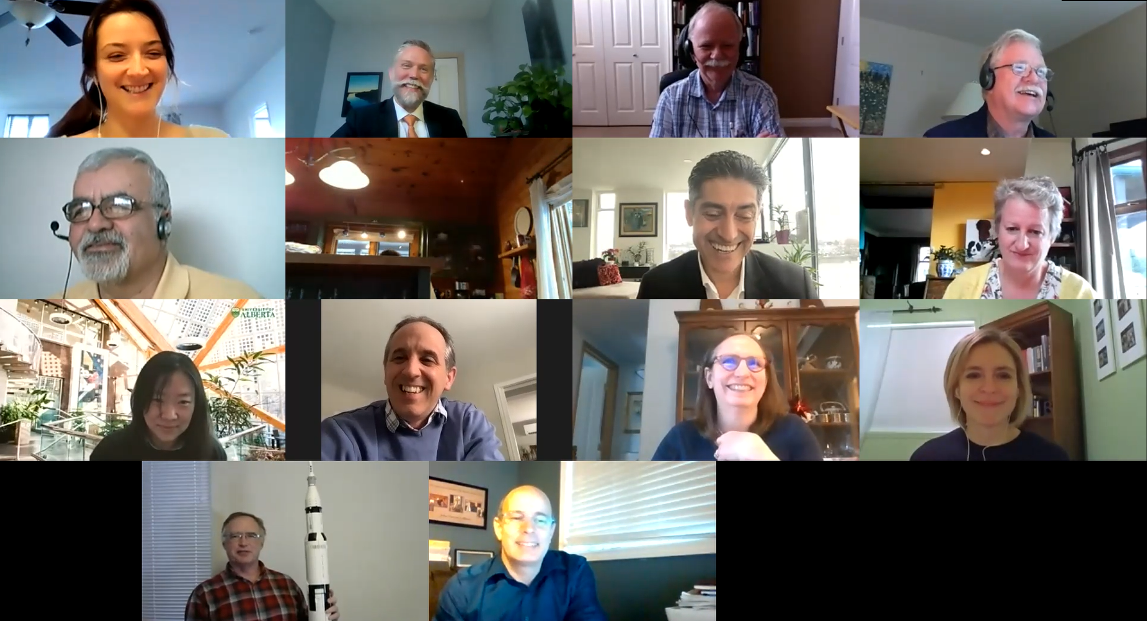

For nearly a year, the world has been coming to understand what it means to work from home. A veritable avalanche of resources has been produced in the past 11 months, but only a small proportion have explored what it means to volunteer from home.
When the Canadian Engineering Qualifications Board (CEQB) met in January, it held a workshop on virtual volunteering, and placed a focus on how the group could continue to be effective without the benefit of face-to-face meetings.
“This has been a very challenging time given that we haven’t been able to meet in person and enjoy the benefits of working closely as a high-calibre group of volunteers,” says Mahmoud Mahmoud, Chair of the CEQB. “My hope is that by innovating in the way we think about and conduct our virtual meetings, and that by discussing virtual volunteering directly as a group, we can have an impact not just on how we conduct our business now, but also in the future.”
The workshop on virtual volunteering invited members to share and discuss a range of topics, including what motivates them to volunteer, the benefits and drawbacks of virtual volunteering, and ultimately how to foster collaboration in the absence of in-person meetings.
“When the pandemic is over we’ll still have some of our meetings within a virtual setting, so if we can improve these now, the benefits will be long-lasting,” says Mahmoud.
The shift to a fully online experience has rippled through Engineers Canada in different ways. The Canadian Engineering Accreditation Board (CEAB), for instance, had to quickly pivot from holding accreditation visits in person to virtually.
In April, with approval from the Engineers Canada Board, the CEAB granted a one-year accreditation cycle extension to all programs, deferring all accreditation visits except for those to new programs. Visits to new programs would still occur and from there, the CEAB got to work designing a virtual visit approach.
“Virtual visits are a completely new way of approaching accreditation,” said Luigi Benedicenti, CEAB Past-Chair and Chair of the Virtual Visits Task Force. “For our volunteers, this has meant leveraging virtual meeting platforms, email communication, and even the telephone to communicate with one another leading into, during, and after the visit. It's about building a team in a virtual setting rather than an in-person one and engaging with the programs we are visiting through a computer screen rather than in a meeting room.”
Suzelle Barrington has been volunteering in some capacity with Engineers Canada for over 20 years, and has been with the CEAB specifically since 2015. An experienced visitor, she emphasizes the importance of building strong relationships with her fellow volunteers and ensuring they have the tools to be successful.
“Transparency, using humour as appropriate to keep everyone in good spirits, being on time, preparing clear schedules and keeping them are very important,” says Barrington. She continues, “For the CEAB, training your visiting team and supporting them during the visits is key.”
The shift to virtual volunteering has had an uneven effect across the group of volunteers. For those who know each other, the transition to virtual has not been as challenging as it is for new members.
Tara Zrymiak, who has been a member of the CEAB since 2017, relates that though it’s been a fairly smooth transition for her, connecting with new committee members is more difficult.
“The biggest challenge is building a relationship with new people introduced to the group since the pandemic restrictions made us go to virtual operation,” says Zrymiak. “It's just not the same when you have never seen a person except over a computer screen. I notice this especially with another volunteer role that I have started since the pandemic began; I'm having more trouble ‘fitting in’ since I didn't experience their in-person meetings.”
Ultimately, what drives volunteers is the contribution they make to the profession. Says Mahmoud, “As always, our desire is to make meaningful, long-term contributions to the Canadian engineering profession, and to that end, I commend everyone who’s done their best to adapt to these very challenging circumstances.”
For more information
Volunteer Canada has compiled numerous resources to support organizations and volunteers throughout the COVID-19 pandemic. Find more at https://volunteer.ca/covid19.


